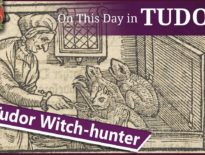On this day in Tudor history, 27th December 1583, scholar and Puritan Katherine Killigrew died after giving birth to a stillborn child.
Katherine was the daughter of renowned humanist and scholar, Sir Anthony Cooke, and was known for her ability at writing poetry and her knowledge of languages, including Hebrew, Latin and Greek. She was a very accomplished Tudor lady.
Find out more about Katherine, and hear the epitaphs that were written in her honour, in today's talk.
Also on this day in Tudor history, 27th December 1539, Anne of Cleves landed at Deal in Kent in preparation for her forthcoming marriage to King Henry VIII. Anne of Cleves would be King Henry VIII's fourth wife. Find out more about her journey, the background to it, and what happened next, in last year’s video:
Also on this day in history:
- 1530 – Death of Thomas Lupset, clergyman and humanist scholar, at Bisham from tuberculosis. He was buried in St Alfege Church, Cripplegate. Lupset joined the household of John Colet in his youth and was taught by William Lilye before attending Pembroke Hall, Cambridge, where he worked with Erasmus on the “New Testament”. Lupset tutored Cardinal Wolsey's son, Thomas Wynter, and was friends with Thomas More, Reginald Pole and John Leland. His works included “Exhortacion to Young Men”, “A Treatise of Charitie” and “Dieyng Well”.
- 1603 – Death of Thomas Cartwright, theologian, Puritan and Master of the Earl of Leicester's Hospital in Warwick. He spent his last days in Warwick and was buried there. Cartwright is known for the struggle between him and John Whitgift, the man who deprived Cartwright of his position as Lady Margaret's Professor of Divinity at Cambridge. Cartwright supported the attack on the Elizabethan church in the form of “An Admonition to the Parliament” by preachers John Field and Thomas Wilcox. Whitgift answered with “Answere to a Certan Libel Intituled, ‘An Admonition’”, Cartwright replied with “Replye”, Whitgift answered again with “The Defense of the Aunswere to the ‘Admonition’, Against the ‘Replie’” and Cartwright responded with “The Second Replie” and “The Rest of the Second Replie”.
- 1615 – Death of John Fenn, Roman Catholic priest and translator. He was buried in the cloister of St Monica's English Augustinian monastery in Louvain, where he was chaplain. Fenn had settled in Louvain while in exile during Elizabeth I's reign. His works included an English translation of Bishop Osorius's treatise against Walter Haddon: “A Learned and Very Eloquent Treatie, Written in Latin”, translations of works by John Fisher, Bishop of Rochester, and the Council of Trent's catechism, and Concertatio ecclesiae catholicae in Anglia, which he co-edited with John Gibbons, a Jesuit.
Transcript:
On this day in Tudor history, 27th December 1583, scholar and Puritan Katherine Killigrew (née Cooke), died after giving birth to a stillborn child.
Katherine was known for her ability at writing poetry and her knowledge of languages, including Hebrew, Latin and Greek.
Let me tell you a bit more about this accomplished Tudor lady…
• Katherine was born in around 1542 and was the fifth daughter of scholar and royal tutor Sir Anthony Cooke and his wife, Anne Fitzwilliam. Her sisters included Mildred, who became the wife of William Cecil, Baron Burghley; Anne, who married Sir Nicholas Bacon, and Elizabeth, who married Thomas Hoby and then John, Lord Russell.
• Katherine grew up at the Cooke family home, Gidea Hall, in Essex.
• Her father was a humanist who believed that daughters should be educated well, and like her sisters, she was educated in the classics. She later became known for her gift at poetry and her knowledge of Hebrew, Greek and Latin.
• By 1564, Katherine was serving Queen Elizabeth I as a maid of honour.
• In 1565, Katherine married diplomat Sir Henry Killigrew of Cornwall. Henry was often away from home on embassies and at one point Katherine wrote to her sister Mildred to intercede with Baron Burghley to excuse Henry from his overseas duties. The message was written in Latin and in verse.
• The Killigrews had four daughters: Anne, Elizabeth, Mary and Dorothy.
• Katherine was a Puritan and was good friends with preacher Edward Dering who visited her at her home at Hendon and who corresponded with her. His letters to her in 1575 were published in The Godly Letters of Mr Dering. In them, Dering writes of her “weak and sickly body” which meant that she could not have as much joy as she should, and seeing it as her cross to bear.
• On this day in history, 27th December 1583, when she was about forty-one years of age, Katherine died following childbirth. The child was stillborn. She was laid to rest in St Thomas the Apostle Church in London, a church which burnt down in 1666, in the Great Fire. Andrew Melvin wrote the following epitaph:
“Apollo’s fav’rite and to Pallas dear,
Adorn’d by ev’ry art her works appear.
Parent and sister of the harmonious nine,
All Greece and Rome did in her numbers shine.
The sacred language too she made her own,
Nor eastern learning was to her unknown.
Faith, modest candour, piety resign’d,
Religious zeal, and purity of mind,
Each grace that love or admiration gains,
Her bosom once, and now, her tomb contains.”
While William Chark wrote:
“Here Kath’rine lies, deriv’d of noble kind,
Of Cooke to Killigrew by marriage join’d,
Enough this notice, for to distant Rhone,
And Rhine, her virtue, and her wit are known,
By fame such lasting monuments are giv’n,
To her, the Muses friend, and saint of Heav’n.”



Leave a Reply